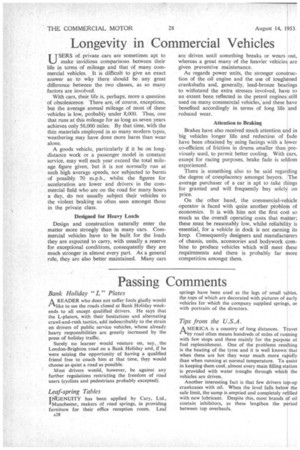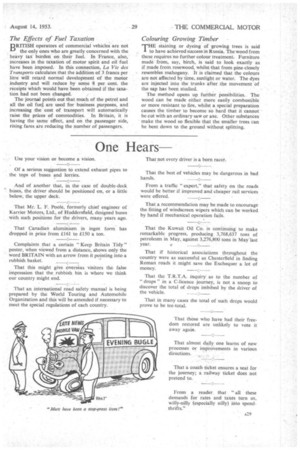Passing Comments
Page 30

Page 31

If you've noticed an error in this article please click here to report it so we can fix it.
Bank Holiday "L" Plates
AREADER who does not suffer fools gladly would like to see the roads closed at Bank Holiday weekends to all except qualified drivers. He says that the L-platers, with their hesitations and alternating crawl-and-rush tactics, add indescribably to the strain on drivers of public service vehicles, whose already heavy responsibilities are greatly increased by the press of holiday traffic.
Surely no learner would venture on, say, , the London-Brighton road on a Bank Holiday and, if he were seizing the opportunity of having a qualified friend free to coach him at that time, they would choose as quiet a road as possible.
Most drivers would, however, be against any further regulations restricting the freedom of road users (cyclists and pedestrians probably excepted).
Leaf-spring Tables
1lsItENUITY has been applied by Cary, Ltd., Manchester, makers of road springs, in providing furniture for their office reception room. Leaf A28
springs have been used as the legs of small t bles, the tops of which are decorated with pictures of arly vehicles for which the company supplied spring or with portraits of the directors.
Tips from the U.S.A.
AMERICA is a country of bang distances. Travel
by road often means hundreds of miles of running with few stops and these mainly for the purpoie of fuel replenishment. One of the' problems restilting is the heating of the tyres and it is well known that when these are hot they wear much .more rapidly than when running at normal temperature. To assist in keeping them cool, almost every main filling st tion is provided with water troughs through whicl the vehicles are driven.
Another interesting fact is that few drivers t -up crankcases with oil. When the level falls below the safe limit, the sump is emptied and completely refilled with new lubricant. Despite this, most brands of oil contain inhibitors, as these lengthen the p riod between top overhauls.
The Effects of Fuel Taxation
BRITISH operators of commercial vehicles are not , the only ones who are greatly concerned with the heavy tax burden on their fuel. In France, also, increases in the taxation of motor spirit and oil fuel have been imposed. In this connection, La Vie des Transports calculates that the addition of 3 francs per litre. will retard normal development of the motor industry and will reduce by some 8 per cent, the receipts which would have been obtained if the taxation had not been changed.
The journal points out that much of the petrol and all the oil fuel are used for business purposes, and increasing the cost of transport will automatically raise the prices of commodities. In Britain, it is having the same effect, and on the passenger side, rising fares are reducing the number of passengers. staining or dyeing of growing trees is said to haveachieved success in Russia. The wood from these requires no further colour treatment: Furniture made from, say, birch, is said to look exactly as if made from rosewood, whilst that from pine closely resembles mahogany. It is claimed that the colours are not affected by time, sunlight or water. The dyes are injected into the trunks after the movement of the sap has been studied. .
The method opens up further possibilities. The wood can be made either more easily combustible or more resistant to fire, whilst a special preparation causes the timber to become so hard that it cannot be cut with an ordinary saw or axe. Other substances make the wood so flexible that the smaller trees can be bent down to the ground without splitting.




















































































